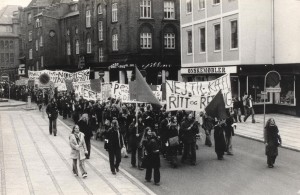
The Student Council has existed since 1932 and is therefore a student organization with many proud traditions.
Below you can read about and get an overview of the most important points in the history of the Student Council

Below you can read about and get an overview of the most important points in the history of the Student Council
1932:
On February 11, the Student Council is founded and recognized by the university as a representation of the university’s students. However, the process of founding the Student Council is characterized by caution: First, a committee is set up to obtain information about the teachers’ assembly’s position on the idea before it is implemented.alized at a student meeting attended by the mayor of the city and the chairman of the teachers’ assembly. This caution also characterized the Student Council’s work in the following years until the early 1960s.
1962-1968:
During this period, the Student Council begins to engage in more regular student political work, characterized by the view that the education system should be assessed based on societal criteria rather than purely academic ones.
At the same time, students are becoming more vocal: they are demanding changes to educational policy objectives, questioning the purpose of the chosenof the chosen curriculum and so on.
1968:
In this year, the criticism culminates in the famous student revolt. Down with the professorship and in with socially relevant education and student influence are the slogans. At this point, the student council is characterized by ideological factions, with predominantly left-wing students. The Student Front is the largest of these and is behind many actions in favor of views similar to those of the Student Council.
The time after the student rebellion is one of the most important for the Student Council, as two crucial things happen during this period: The students manifest themselves as an independent interest group that manages to make themselves visible both inside and outside the university walls. In addition, students have a say in the university’s management.
1970:
The Danish Parliament passes the first Governance Act, giving students some influence – especially at the study board level.
1971:
The Governance Act is enacted, but causes large and violent demonstrations. This is because the law repeals the 1921 royal decree that recognized the student councils at the country’s universities as the students’ representations. Instead, politicians, encouraged by the most persistent factionalists in the Student Council, introduce a list election for student representatives in the governing bodies. The Student Council sees this as interference in the students’ organizational affairs and therefore chooses to boycott the work of the governing bodies in the hope of changing the law.
1973:
Under the new government, changes are planned to the Governance Act, but this will not happen, and the aforementioned issues regarding list elections will remain. However, the Student Council still chooses to join the Governing Bodies.

1999:
Although the Student Council and Moderate Students have previously disagreed on methods and goals for student political work, during the 1990s there was a realization that both organizations ultimately work for the same thing – a better student life for the students. Therefore, since 1999, they have worked together in a unified organization, where all students at Aarhus University are once again represented by a unified and strengthened organization.
2007:
Aarhus University merges with, among others, Aarhus School of Business (ASB), and the Student Council initiates collaboration with the Student Guild from ASB in the organization De Studerendes Råd og Laug (SRL), which has been behind Denmark’s Biggest Friday Bar.
2020:
This year has been characterized by major lockdowns due to COVID-19. For many students, this has meant isolation, loneliness and problems with focus and motivation. That’s why the Student Council has put itself at the forefront as the students’ voice with well-being and mental health as core issues. Furthermore, the Student Council has been the first to communicate new information to students to create as much clarity about their situation as possible. The Student Council has had a representative in the Youth Crisis Management in Aarhus Municipality, which means that we have fought for the well-being of the city’s students at many political levels. 2020 was also the year when the Student Council was instrumental in getting the activity requirement abolished. It was a step in the direction away from the artificial pressure that has been placed on many students.